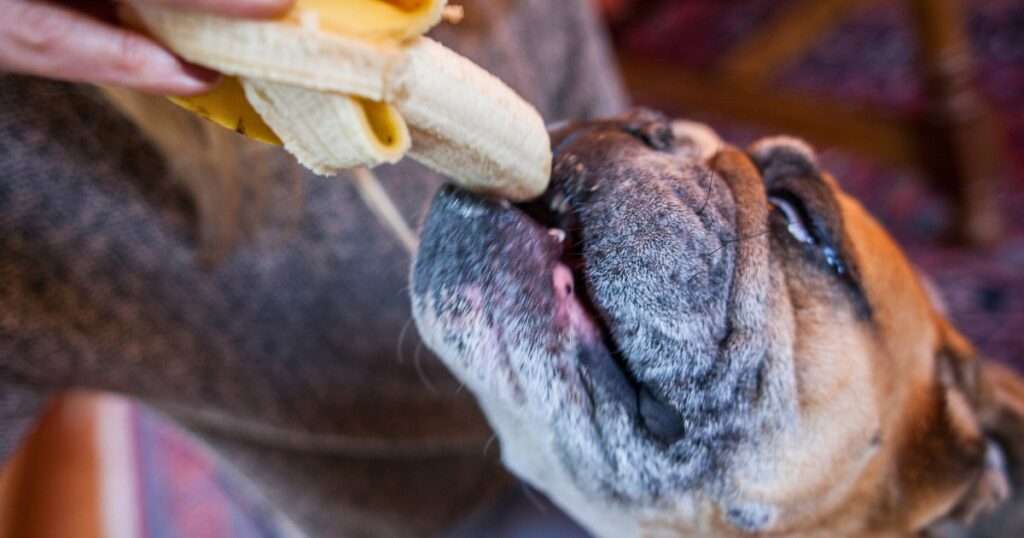Note: Prior to introducing any new foods, particularly those meant for human consumption, consult your veterinarian to ensure they are suitable for your dog. The appropriateness of a particular food can vary based on factors such as your dog’s age, health history, existing health conditions, and dietary needs. It is crucial to refrain from providing any food or treats beyond the prescribed diet for dogs on specialized diets. Next, we will dive into the question, “Can dogs eat bananas?” (AKC)
Bananas are a popular and nutritious fruit enjoyed by humans around the world. Their sweet taste, convenience, and abundance of health benefits make them a go-to snack for many. As pet owners, it’s natural to wonder whether our canine companions can also partake in this tasty treat. So, can dogs eat bananas? Let’s delve into the benefits and risks associated with feeding bananas to dogs. Understanding whether dogs can eat bananas is essential for their health. Bananas are versatile and can be served in various ways, including slices, mashed, or frozen, making them an enjoyable treat for dogs.
7 Benefits of Bananas for Dogs
- Potassium support – Helps normal muscle and nerve function.
- Vitamin B6 – Supports metabolism and healthy brain function.
- Vitamin C – Antioxidant support for overall wellness.
- Digestive fiber – Aids regularity and can support gut health.
- Quick energy – Natural sugars can help active pups after exercise.
- Low fat – A sweet option that is lower in fat than many treats.
- Easy to use – Mash into Kong fillings, mix into bake-at-home treats, or freeze for a summer snack.
Quick treat idea: Mix ½ ripe banana with plain unsweetened yogurt and a spoon of oatmeal, then freeze in silicone molds.
Rich in Nutrients
Bananas are a good source of essential nutrients such as potassium, vitamin C, vitamin B6, and dietary fiber. These elements contribute to overall health and can be beneficial for dogs, just as they are for humans.
In addition to being rich in nutrients, bananas can be a delightful addition to homemade dog treats. For example, mixing banana puree with oats and peanut butter can create a nutritious dog cookie that many pets enjoy. Furthermore, these treats can be baked and stored for later, providing a healthy snack option for your furry friend.
Natural Energy Boost
The natural sugars in bananas – fructose, glucose, and sucrose – can provide a quick and healthy energy boost. This can be particularly useful for active dogs, such as those involved in agility training or long walks.
For dogs that require extra energy due to high activity levels, bananas can be given before or after exercise. This quick energy source can help replenish their energy stores and keep them active and playful. Many dog owners have noted that their pets seem to have a boost in energy after consuming bananas, which can enhance their playtime and overall happiness.
Supports Digestive Health
Bananas contain soluble fiber, which aids in maintaining a healthy digestive system. Introducing small amounts of banana into a dog’s diet can assist in regulating bowel movements and preventing constipation.
The soluble fiber in bananas can also act as a prebiotic, promoting the growth of beneficial bacteria in the gut. This can lead to better digestion and overall gut health for dogs. Moreover, regular inclusion of banana in moderation can help with maintaining a balanced gut flora, which is crucial for a dog’s immune system.
Low in Fat and Cholesterol
Unlike some human snacks, bananas are low in fat and cholesterol. This makes them a heart-friendly treat for dogs, especially those with weight management concerns.
Dogs that are overweight or have specific dietary restrictions can especially benefit from bananas as a treat option. Because they are low in fat, they can satisfy a dog’s craving for something sweet while also being mindful of their overall calorie intake. Using bananas as a substitute for higher-calorie snacks can aid in weight management for dogs.
The Risks of Bananas for Dogs
High Sugar Content
While the natural sugars in bananas can provide a quick energy boost, it’s important to be mindful of the overall sugar content. Excessive sugar intake can lead to weight gain, dental issues, and, in rare cases, contribute to conditions like diabetes.
It’s important to note that the high sugar content in bananas, while natural, does mean that they should not be the primary source of treats. Instead, they should complement a balanced diet with appropriate portions. Pet owners should keep this in mind, especially in cases of diabetic dogs or those prone to obesity.
Portion Control is Key
Moderation is key when it comes to feeding bananas to dogs. Too much of any treat, including bananas, can upset a dog’s stomach and potentially lead to diarrhea.
To prevent any stomach upset or digestive issues, it’s advisable to start with just a small piece of banana to see how your dog reacts. If your dog enjoys the banana without any adverse effects, you can gradually increase the amount. Remember that treats, including bananas, should make up no more than 10% of your dog’s daily caloric intake.
Simple Portion Guide
- Tiny dogs (under 10 lb) – 1 to 2 thin slices, once or twice a week.
- Small dogs (10–20 lb) – 2 to 3 thin slices.
- Medium dogs (20–50 lb) – 3 to 5 thin slices.
- Large dogs (50–90 lb) – 4 to 6 thin slices.
- Giant breeds (90+ lb) – Up to ½ small banana, not daily.
These are general guidelines, not medical advice. Adjust based on your dog’s total diet and activity level, and ask your veterinarian if unsure.
Allergies and Individual Sensitivities
Dogs, like humans, can have individual sensitivities and allergies. Before introducing bananas into your dog’s diet, it’s advisable to start with small amounts to monitor for any adverse reactions, such as itching, digestive upset, or changes in behavior.
Some dogs may display allergies or sensitivities to bananas, although such cases are relatively rare. Observing your dog for any signs of discomfort or unusual behavior after introducing a new food can help you gauge their tolerance. If you notice any concerning symptoms, consult your veterinarian for advice on dietary management. (
Avoid the Peel
While the banana itself is generally safe for dogs, the peel can be harder to digest and may cause gastrointestinal issues. It’s recommended to remove the peel and offer only the ripe fruit in small, manageable pieces. (PetMD)
In addition to removing the peel, it’s also important to ensure that the bananas are ripe. Unripe bananas contain higher levels of starch, which can be harder for dogs to digest. Feeding only ripe bananas in moderation ensures that your dog enjoys the optimal health benefits.
Conclusion
In conclusion, dogs can indeed eat bananas in moderation, and there are several health benefits associated with this fruit. However, it’s crucial to be aware of potential risks, such as the high sugar content and the importance of portion control. As with any new addition to your dog’s diet and nutrition, it’s wise to consult with your veterinarian to ensure that bananas are a suitable and safe option for your individual furry friend. When introduced responsibly, bananas can be a delicious and nutritious occasional treat for your canine companion. Ultimately, understanding the question of can dogs eat bananas allows pet owners to make informed decisions about their dog’s nutrition and health.
Zoomy Dog is your trusted source for expert advice, trending tips, and heartwarming stories every dog parent needs. From nutrition and training to health, wellness, and everyday care, we combine research-backed insights with a passion for pups to help you give your dog the happiest, healthiest life possible. At Zoomy Dog, we believe dogs aren’t just pets, they’re family.

